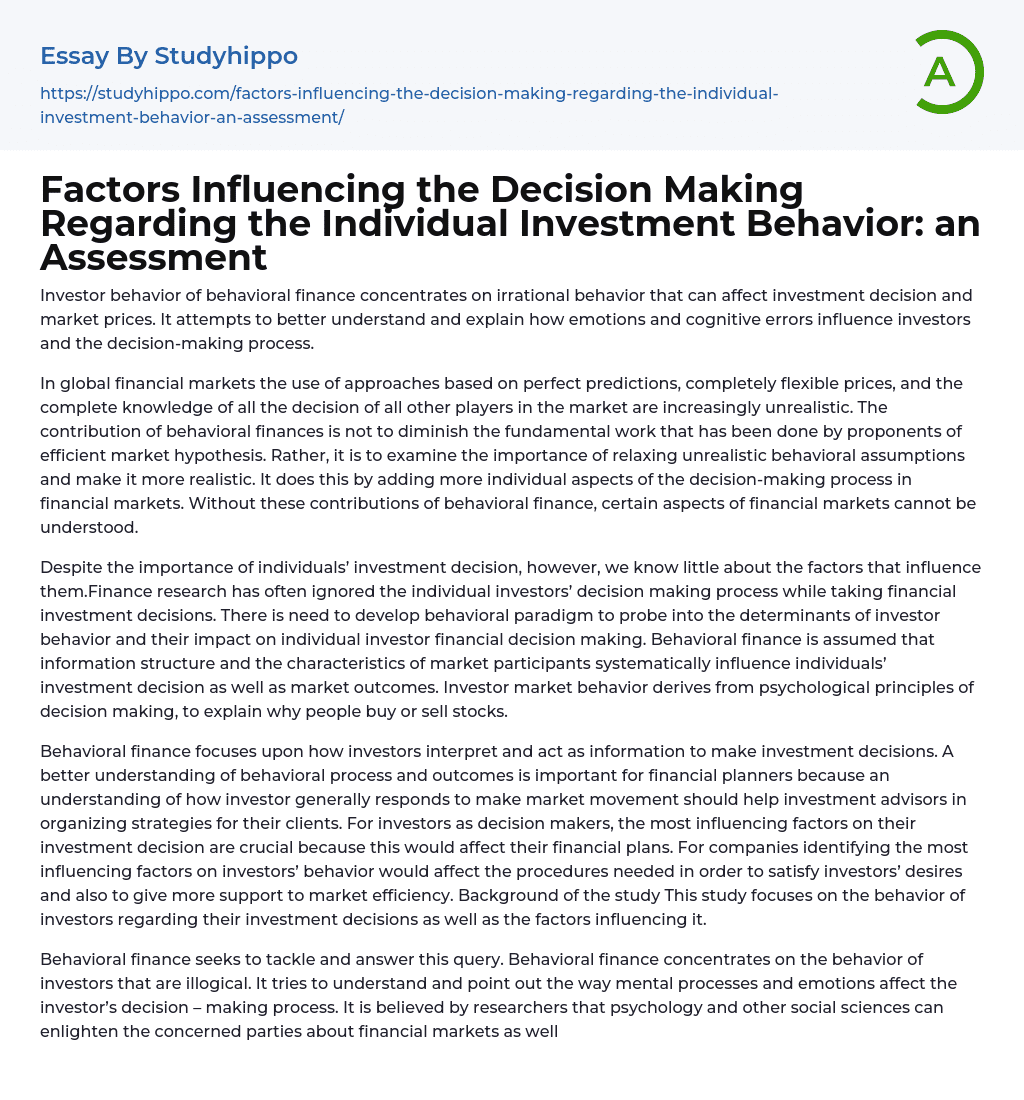

Exploring Irrational Investor Behavior in Global Financial Markets.
Behavioral finance focuses on the irrational behavior of investors and its impact on investment decisions and market prices. The objective is to understand how emotions and cognitive errors influence the decision-making process of investors. In today's global financial market, relying on approaches that assume perfect predictions, flexible prices, and complete knowledge of other players' decisions is becoming less realistic. Rather than undermining the efficient market hypothesis, behavioral finance aims to recognize the importance of considering more realistic behavioral assumptions. This integration involves incorporating individual aspects of decision-making in financial markets.
Behavioral finance is a crucial field for comprehending various aspects of financial markets. Despite recognizing the significance of individuals' investment choices, there is limited understanding about the factors that shape these decisions. Research in finance has often overlooked the decision-making process of individual investors regarding financial investmen
...ts. It is imperative to establish a behavioral paradigm that examines the factors determining investor behavior and how this behavior affects their financial decision making. Behavioral finance assumes that both individuals' investment decisions and market outcomes are systematically influenced by the information structure and characteristics of market participants. Psychological principles of decision making guide investors' behavior in the market, offering insights into why people choose to buy or sell stocks.
Behavioral finance studies how investors interpret and utilize information when making investment decisions. Financial planners benefit from understanding the behavioral processes and outcomes, as it helps them develop strategies for their clients based on how investors typically respond to market movements. For decision-making investors, identifying the most influential factors on their investment choices is crucial, as it impacts their financial plans. Likewise, companies that understand these influencing factors can adapt procedures
to meet investors' desires and support market efficiency. This study investigates investor behavior and its factors, aiming to address the query through the lens of behavioral finance.
Behavioral finance is concerned with the illogical behavior of investors and seeks to comprehend how their thoughts and emotions impact their decision-making. Experts assert that fields like psychology and social sciences can offer valuable insights into financial markets, encompassing stock volatility and deviations from the norm. Consequently, conventional approaches in the global market may not consistently predict investor choices, highlighting the importance of behavioral finance in understanding otherwise incomprehensible aspects of financial markets.
There is often a lack of attention in financial research towards how individuals make investment decisions, which results in a disconnect with actual financial investments. In the Philippines and similar countries, stock markets present a lucrative opportunity for investors to earn significant profits and have an increasingly strong influence on savings flow. However, it is crucial for potential investors to comprehend the risks involved. The Philippine Exchange has been one of Southeast Asia's oldest stock markets since 1927. This study specifically examines individual investment behavior and the factors that impact this behavior.
The research focuses on understanding the factors that influence individual investors' investment behavior, including their importance and impact on decision-making. Behavioral finance is crucial in addressing these questions. The study specifically examines risk tolerance, perception of company image, company stability, and return on investment (ROI) as predictors of investor behavior. Through analyzing these predictors, we can determine the relative significance of the techniques utilized by investors in making investment decisions.
The research aims to analyze the influence of respondents' demographic characteristics, including age, gender, education level, and
investment experience, on their responses. This examination assists in identifying the factors that affect how individual investors make financial decisions. Additionally, the study explores how emotions and mental errors impact investors and their choices. Professional investors can gain valuable insights into behavioral traits, biases, and mistakes made by individual investors through this research. Moreover, such information can be beneficial for financial services firms in developing products and devising effective marketing strategies.
This research can be beneficial for regulators to create new policies and revise existing ones to cater to the dynamic business market. It can educate investors about biases to enhance the welfare of individual investors. Investors can also analyze their mistakes and biases in financial decision-making, improving their investment behavior to make optimal decisions. By comprehending human behavior and psychological responses in the decision-making process, it can provide a more comprehensive explanation of today's evolving financial market.
- Perseverance essays
- Expressive essays
- Character Traits essays
- Apology essays
- Compassion essays
- Incentive essays
- Investing essays
- Asset essays
- Depreciation essays
- Discounted Cash Flow essays
- Foreign Direct Investment essays
- Funds essays
- Internal Rate Of Return essays
- Revenue essays
- Day Trading essays
- Futures Trading essays
- Capital market essays
- Million essays
- Payment essays
- Rate Of Return essays
- Funding essays
- Hedge Fund essays
- Adult essays
- Aggression essays
- Altruism essays
- Archetype essays
- Behavior essays
- Certainty essays
- Conformity essays
- Deception essays
- Human Behavior essays
- Human Sexuality essays
- Maturity essays
- Morality essays
- Obedience essays
- Procrastination essays
- Reinforcement essays
- Role Model essays
- Board Of Directors essays
- Brand Management essays
- Business Ethics essays
- Business Management essays
- Change Management essays
- Comparative Analysis essays
- Decision Making essays
- Dispute Resolution essays
- Knowledge Management essays
- Leadership essays
- Leadership and Management essays
- Manager essays



